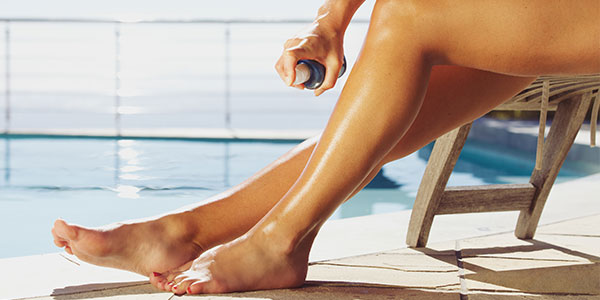The Dark Side of Tanning
Although the threat of skin cancer deters some of us from soaking up the sun, many Americans still devotedly pursue the perfect tan at beaches and tanning salons across the country.
Richly tanned skin has evoked images of wealth, beauty and glamour since the 1920s, but those aspirations come at a cost. According to the American Academy of Dermatology, one in five Americans will develop skin cancer in their lifetime, mostly from sun exposure.
Tanning Equals Skin Damage
People often think a good tan gives them a ‘healthy glow,’ but having a tan actually means that your skin is trying to protect itself from sun damage. When you expose your skin to sunlight, it responds by producing melanin, a dark substance that helps prevent absorption of too many harmful ultraviolet rays. But this process still compromises your skin, making it more susceptible to premature aging and cancer.
To make matters worse, there’s a fine line between tanned and burned. And if you sunburn more than five times in your life, you double your risk for melanoma, the most serious type of skin cancer.
Exposure Over the Years
There’s no such thing as safe sun exposure. Cumulative sun exposure over a lifetime leads to skin cancer, so the less you accumulate the safer you are.
That’s especially true if you have fair skin, but you can still get skin cancer even if your skin is naturally dark. If you spend your entire life working outdoors, you may be at high risk for skin cancer no matter how melanated you are. Through the years, cumulative exposure can override the natural protection of naturally dark skin.
However, all is not lost if you were a young sun worshipper but started protecting your skin in your adult years. You can’t reverse earlier sun exposure, but if you spend less time tanning now, you put a stop to the cumulative effects of sun damage.
Give Up Indoor Tanning
You may think that tanning salons provide a safer, more controlled environment. But just 15 to 30 minutes in a tanning bed is equivalent to a full day at the beach and may expose you to even more harmful UV light than the sun. Overuse can eventually lead to prematurely aged skin, skin cancer and eye damage, especially if you don’t wear goggles.
Moreover, no agency regulates tanning salons, so there’s no way to measure exactly how much UV exposure you get during each session. They’re so unsafe that many states, including California, have laws prohibiting indoor tanning for children under 18. And if you use them before age 35, you increase your melanoma risk by a whopping 60%.
Get Tan Without the Sun
You still have one way to acquire a “tan” safely — make a trip to your local drugstore and purchase a sunless spray or self-tanning cream that uses dihydroxyacetone to color the skin. These products carry few risks, but avoid contact with your eyes, nose and mouth for less chance of irritation and allergic reaction.

While safe, sunless sprays and self-tanners do have a potential downside. They give people an artificial sense of safety. Even though you look tan, the lotion or spray doesn’t protect your skin from the sun. You still have to use sunscreen.
The Future of Tanning
Will tanning be off-limits forever? Possibly not. Scientists are studying how to get the skin to release melanin on its own to create a natural, protective tan without UV exposure.
But that enticing option remains decades away, so for now, always use sunscreen when you’re outside, sunbathe as little as possible and follow smart sun protection tips.
Healthy Skin at Every Age
From acne to aging, our dermatology teams provide high-quality care to help your skin look and feel its best.




